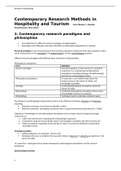Research Methodology
Contemporary Research Methods in
Hospitality and Tourism - Fevzi Okumus, S. Mostafa
Rasoolimanesh, Shiva Jahani
2. Contemporary research paradigms and
philosophies
Core distinctions in different research paradigms and philosophies.
Advantages and challenges associates with different philosophical approaches to research.
Research paradigms can be characterized by the way their proponents respond to three basic questions, which
can be characterized as the ontological, the epistemological, and the methodological question.
Different research paradigms yield different types and levels of understanding
Philosophical assumptions:
Term Definition
Research paradigm Overall perspective on how research is/ should be
conducted. It is underpinned by philosophical
assumptions (including ontology and epistemology)
and informs methodological choice.
Philosophical assumptions A researcher’s set of beliefs holds about the
research process, the nature of reality, and
knowledge acquisition.
Ontology Combined philosophical assumptions about the
nature of reality.
Epistemology Combined philosophical assumptions about nature
of knowledge and how it is acquired.
Methodology Techniques used to undertake scholarly inquiry.
The discourse in methodological approaches centers on the differences between inductive and deductive
reasoning.
Deductive reasoning = from theory to identify “reality”.
Inductive reasoning = developing conclusions from a range of phenomena experienced as “reality”.
Cognizance (=knowledge) of how philosophical foundations serve to shape research design encourages
researchers to:
1. Make informed decisions regarding the methodological approach
2. Evaluate the range of research design choices and strategies consistent with their research aim.
3. Adapt assumptions regarding research design in order to increase the likelihood of generating
meaningful results.
Ontological position
Understanding the core question: “what is real”
Ontological discourse on whether the researcher holds an objective or subjective perspective on the
nature of reality.
researcher’s ontological stance shapes subsequent epistemological assumptions and the research
positioning.
Epistemological position
1
, Research Methodology
Shapes research design, influencing how researchers explore reality, truth, and human nature, and
knowledge creation is determined by the researcher-subject interface.
Two core positions dominate discourse regarding how researchers can generate knowledge:
empiricism and rationalism.
o Rationalism = a positivist approach favoring ontological objectivity, alongside hypothesis
testing and verification, and is often concerned with the pursuit of generalizability to its
preference for large, representative samples.
o Empiricism = participant sense-making, echoing the interpretive view that both knowledge
and reality are fundamentally socially constructed. It focuses on the interpretation of data via
dialectic and hermeneutic means, allowing researchers to achieve greater personal insight
into phenomena by drawing upon descriptive data in depth and detail. Research from smaller
sample sizes to attain a subjective understanding of phenomena under investigation. Not
easily generalized, however capability to develop a broad understanding.
Encourage the adoption of various perspectives and recognizing the value of studies approaching similar
problems from different philosophical underpinnings.
The study characteristics under investigations should shape the research design while echoing the
researcher’s philosophical perspective.
Most dominant philosophical stances:
Positivism and post-positivism
Interpretivism / social constructivism
Pragmatism
Positivism
Popularized by the French philosopher, Auguste Comte, during the Age of Enlightment.
Rooted in the principle of the natural sciences, favored with tourism and hospitality.
Precise and measurable data
Core belief in a singular sovereign “truth” used to shape phenomena by developing and testing
hypotheses.
Reality is independent
o external, open to objective measurement
o individual values, biases, and beliefs are incapable of altering conducted study results.
Knowledge is unearthed, not manufactured or interpreted, with measured and measurable facts,
propositions, and hypotheses core to knowledge creation.
Ontological assumption: Realism
Realism refers to researchers that are independent of objects or phenomena under investigation
Epistemological assumption: knowledge can only be derived from what is observable.
Post-positivism
Same assumptions as positivism regarding the nature of reality and recognizes the inherent
relationship between researcher and subject.
Questions the concept of absolute truth and objective knowledge when investigating human
behaviors.
Deterministic with emphasis on identifying sources of causality. Also a reductive undercurrent, with
emphasis on developing testable hypotheses and propositions from which to develop knowledge.
Reality is independent
o objective, observable, and measurable, with an emphasis on conducting hypothetic-deductive
research, which balances theoretical underpinning with statistical analysis.
Researchers are not value-free critical realism
2






